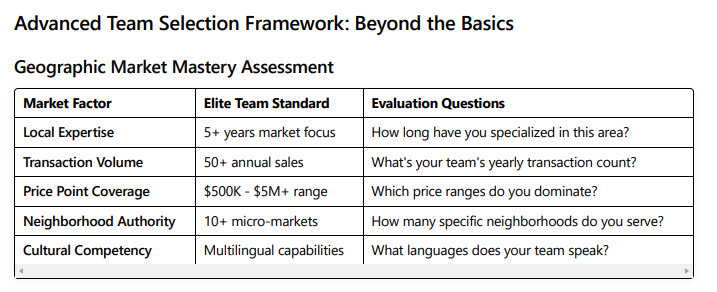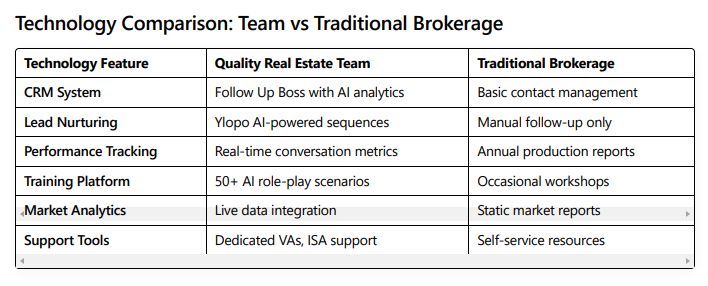How Do I Choose the Right Real Estate Team in Los Angeles?
Complete Decision Framework for Agents
Quick Answer: The right Los Angeles real estate team offers proven training systems, accountability structures, and technology that accelerates your learning curve. Look for leadership with documented results, genuine mentorship opportunities, and cultures prioritizing agent development over splits.
Following recent NAR settlement changes and new buyer representation agreements, choosing the right team environment has become critical for agent success in 2025. Modern agents need stronger consultation skills than ever before.
Leadership Development Opportunities
Traditional Path: Agent → Senior Agent → Possible Team Lead
Accelerated Path: Agent → Specialist → Mentor → Leadership → Expansion Team Lead
Quality teams provide multiple advancement tracks:
Listing Specialization: Focus on seller representation and market expertise
Buyer Specialist: Master consultation and negotiation skills
Team Mentorship: Guide new agents while building leadership experience
Geographic Expansion: Lead new market penetration efforts
Technology Innovation: Spearhead team systems and process improvement
Alternative Scenarios: When Teams Aren't Right
High-Performing Solo Agents
Established agents with strong systems, consistent income, and effective accountability might not benefit from team constraints. However, many successful solo agents join teams for leverage opportunities they can't achieve alone.
Consider Teams If You:
Want to scale beyond personal production limits
Lack advanced technology infrastructure
Need accountability for consistent growth
Desire mentorship for next-level skills
Stay Solo If You:
Have systematic business operations
Prefer complete autonomy in decisions
Maintain strong accountability independently
Focus on personal brand building
Part-Time Agent Considerations
No minimum experience required, but part-time agents typically can't keep up with high accountability standards. Teams require commitment to systems and consistent activity levels.
Alternative Options:
"Indie team" arrangements for reduced training/higher splits
Gradual transition periods to test compatibility
Modified accountability structures for part-time schedules
Geographic Limitations
Some teams focus on specific markets or property types. Ensure team geographic focus aligns withyour target client base and market expertise goals.
Evaluation Criteria:
Does their market area match your target geography?
Do they have established client bases in your preferred locations?
Are their marketing systems optimized for your target demographics?
Key Decision Framework for Team Selection
Training Quality: Teams with structured onboarding, daily skill development, and documented success stories from recent agents
Technology Stack: Modern CRM systems, AI-powered lead nurturing, and performance
tracking tools providing competitive advantages
Accountability Systems: Clear metrics, regular coaching, and conversation tracking driving consistent income-producing activities
Leadership Accessibility: Team leaders actively coaching, providing deal guidance, and investing in agent development
Geographic Authority: Teams with documented market expertise and established client bases in target areas
Growth Opportunities: Career paths beyond basic sales to listing specialization, mentorship roles, and leadership development
Cultural Alignment: Values-driven environments where collaboration and mutual success create sustainable business relationships
Why Team Selection Matters More Than Ever in 2025
As traditional real estate practices evolve, agents need stronger consultation skills and deeper market knowledge to succeed. The harsh reality is that most agents will not make it. Without the right guidance, the attrition rate is very high after 3 years.
Modern successful agents require integrated technology stacks and systematic approaches that didn't exist five years ago. The shift toward team-based models reflects fundamental changes in client expectations and market complexity.
When agents ask me about team selection, here's what I tell them: your choice of business environment will determine whether you spend years figuring out what works or fast-track your growth with proven systems and mentorship.
The 5 Essential Questions Every Agent Should Ask
1. What Does Daily Training Actually Look Like?
Most teams promise training but deliver outdated material or generic workshops. Look for specific, hands-on skill development that actually works.
We start mornings sharpening skills. Each week covers different topics—objection handlers, role-playing client calls, refining agent-to-agent communication. This isn't just practice. It's about constantly sharpening tools that make you effective in the field.
Red flags: Teams mentioning "weekly meetings" without describing actual skill-building content. Or those relying solely on third-party training materials.
2. How Do You Track and Improve Agent Performance?
Successful teams use data to identify performance gaps. They provide targeted coaching based on real metrics, not guesswork.
We use Follow Up Boss to review call analytics and AI summaries. Plus appointment reminders in the CRM. Agents get constant feedback on appointment ask percentage versus appointments actually set.
This accountability isn't micromanagement. It's professional development that turns conversations into closings.
3. What Technology Advantages Do You Provide?
Today's market demands more than basic CRM access. Agents need integrated systems that create real competitive advantages over solo practitioners.
They used Ylopo to nurture clients and gain insight. The system shows when prospects have high intent to buy or sell based on activities. This intelligence transforms how agents prioritize their time.
Look for teams offering integrated lead generation. AI-powered nurturing systems. Real-time market analytics. These tools give you advantages over solo agents and traditional brokerages.
4. How Accessible Is Leadership for Coaching and Deal Guidance?
Justin and May review offers before they go out. This ensures offers are airtight and provides coaching on deal positioning. Hands-on support prevents costly mistakes and accelerates learning.
Many teams claim mentorship but their leaders are too busy with personal production. They can't provide real guidance. Verify that coaching and deal support are built into team structure, not just promised as benefits.
5. What Does Success Look Like in the First Year?
A $100k producer follows specific patterns. They hyperfocus on prospecting at least 2 hours daily for new hot leads. Then follow up for 1 hour. They only take appointments in afternoons to protect prospecting time. They go on at least 2 appointments weekly.
The right team provides clear success metrics. They offer structured paths to achieve results, not
vague promises about "unlimited earning potential."
Enhanced Success Metrics: Data-Driven Performance Standards
Common Team Selection Mistakes to Avoid
Focusing Only on Commission Splits
Many agents choose teams based primarily on splits. They ignore the support structure that drives actual income. Commission splits range from 70/30-50/50 versus competitors offering as low as 40/60 splits favoring the team.
However, higher splits mean nothing if you're not equipped to generate consistent business. Focus on the total package of training, leads, and support. These elements drive your actual take-home income.
Overlooking Cultural Fit
Not every agent fits every team—and that's good. The agents thriving with us are coachable, hungry to learn, and have genuine thirst for growth.
Cultural misalignment leads to frustration and turnover. Make sure team values and working styles match your personality. Also verify they align with your career goals.
Underestimating the Importance of Accountability
Most agents don't know how to be their own boss. Nobody taught us, and that's okay. However, something has to give for success to happen.
Many agents resist accountability structures. But systematic tracking and coaching separate successful agents from those who struggle. Look for teams that embrace metrics and data-driven improvement.
How The Borges Real Estate Team Solves Common Selection Challenges
After 13 years in the industry and building a team with 70% year-over-year growth for 4 consecutive years, we've learned what agents actually need to succeed versus what they think they want.
Proven Training Systems That Work
We teach them to think of scripts as a flowchart of need-to-ask questions — it's about repetition and knowing the must-asks so you never leave a call without the essential information. Agents should keep the script exactly the same until they reflect on calls to see what is naturally working and what needs to be tweaked.
Our approach focuses on mastering fundamentals first, then personalizing through experience—not jumping straight to "finding your own style" without building core competencies.
Technology That Provides Real Competitive Advantages
50+ AI Role-Playing Scenarios - Practice makes perfect, but perfect practice makes champions. Our agents train on everything from expired listings and FSBOs to PPC leads, open houses, and even challenging situations like asking sellers for price reductions.
We provide technology tools that most agents can only dream of accessing, creating measurable advantages in lead conversion and client service.
Leadership That's Actually Accessible
Justin Borges – Team Leader & Coach: Agents look to Justin for one-on-one coaching, situational deal advice, script mastery, and accountability. He's in the trenches with the team, helping them sharpen conversations and structure deals the right way.
This isn't delegated to an assistant or junior coach—experienced leadership provides direct mentorship and deal guidance.
Clear Path to Real Results
At 21, new to LA from San Diego with no clear direction and mounting bills, Allie walked into our office ready to try real estate. Today, just 2.5 years later, Allie is one of our top-producing listing specialists, earning over $150,000 annually.
We don't just promise results—we have documented case studies of agents achieving substantial success within their first years.
The Selection Process: What to Look for During Interviews
Ask About Recent Agent Success Stories
Request specific examples of agents who've joined in the past two years and their actual results. Pam had spent two decades climbing the corporate ladder in banking. By May of her first year, Pam had closed enough deals to earn more in that single month than she'd made in an entire year at the bank. The result? Over $8 million in first-year production.
Genuine teams will share real stories with verifiable details, not vague claims about "top performers."
Observe Team Culture During Your Visit
Brandy Borges – Vision Leader & Culture Builder: Brandy is the vision leader, defining culture and ensuring that new agents align with the team's core values (Creativity, Collaboration, Optimism, Obsession, Good Vibes Only, Growth).
Pay attention to how team members interact, the energy in the office, and whether the stated values are actually reflected in daily operations.
Review Their Technology and Systems
Real-Time Performance Analytics - No more guessing what's working. Track your: Call quality grades, Talk time vs. listening ratios, Objection handling success rates, Appointment asking frequency, Appointment setting conversion rates
Ask for a demonstration of their actual systems, not just descriptions of capabilities.
Understand the Onboarding Process
30-Day Onboarding: Establishing scripting patterns, ensuring 20 two-minute conversations weekly, optimizing calls-to-conversations ratio and conversations-to-appointments ratios
The first 30 days determine whether agents build momentum or struggle. Look for structured, measurable onboarding that sets clear expectations and provides immediate support.
Making Your Final Decision: A Practical Framework
Evaluate Total Opportunity, Not Just Immediate Benefits
Growth path looks like: Rookie → Specialist → Mentor → Leadership. Opportunities to grow into listing specialists, mentors, and eventually leadership roles or Borges expansion teams.
Consider where you want to be in 3-5 years, not just your immediate income needs.
Test Their Commitment to Your Success
Recruiting Philosophy: Completely detached from whether agents join; want to help even if doesn't result in working together
The best teams focus on helping you make the right decision for your career, not just convincing you to join their roster.
Verify Claims with Current Team Members
Speak directly with agents who've been on the team for 1-2 years to understand their actual experience versus the promises made during recruitment.
When to Consider Alternatives to Team Joining
If You're Already Highly Successful Solo
Established agents with strong systems, consistent income, and effective accountability structures may not benefit from team constraints. However, many successful solo agents join teams for leverage and growth opportunities they can't achieve alone.
If You Prefer Complete Autonomy
Experience Requirements: No minimum experience, but part-time agents typically can't keep up with high accountability
Teams require commitment to systems and accountability. If you're not willing to follow proven processes or maintain consistent activity levels, solo practice might be better suited to your working style.
If Geographic Limitations Exist
Some teams focus on specific markets or property types. Ensure the team's geographic focus aligns with your target client base and market expertise goals.
Red Flags to Avoid During Team Selection
Promises That Sound Too Good to Be True
Beware of teams promising immediate success without discussing the required work and commitment. The biggest misconception is that you don't have to make calls to close deals. There is no way around it — conversations are king.
Lack of Transparency About Expectations
Teams that won't share specific metrics, performance standards, or accountability requirements are likely hiding problems or don't have systematic approaches to agent development.
Focus on Recruitment Over Retention
Ask about average agent tenure and retention rates. Average Agent Tenure: 2.5 years (reflects new team status) High turnover might indicate cultural or support issues.
Outdated Technology or Systems
In 2025, agents need modern tools to compete effectively. Teams using outdated CRM systems or lacking AI-powered lead nurturing put their agents at significant disadvantages.
Advanced Considerations for Team Selection
Long-term Career Planning Integration
Consider how team membership fits into your broader career goals. Do you want to eventually start your own team? Focus on luxury markets? Develop specific expertise areas? Choose teams that support these longer-term objectives.
Financial Structure Beyond Splits
Evaluate the total cost of business, including desk fees, technology costs, marketing expenses, and transaction fees. Also consider lead generation costs and whether the team provides qualified opportunities or just raw leads.
Market Position and Brand Recognition
Geographic Focus: Pasadena, San Gabriel Valley, and Los Angeles Teams with established market presence and brand recognition can provide competitive advantages through referral networks and market credibility.
Taking Action: Your Next Steps
Schedule Consultation Conversations
Rather than just interviewing teams, engage in consultative conversations about your goals and challenges. If you're thinking about joining a team, here's my advice: decide who is the vehicle that will get you to your goals. But first, make sure your goals are intentional and clear.
Evaluate Multiple Options
Don't make decisions based on the first team you meet. Compare at least 2-3 options to understand different approaches and find the best fit for your situation.
Consider Trial Periods or Shadowing Opportunities
Some teams offer shadowing or trial arrangements that let you experience their culture and systems before making full commitments.
The Bottom Line on Team Selection
What you'll learn in six months on a good team would take you three years to figure out on your own. Don't let ego slow you down — ego is the slowest way to the top.
The right team accelerates your learning curve, provides competitive advantages, and creates accountability structures that drive consistent results. The wrong team can slow your progress and create frustration that impacts your long-term success.
Your team selection decision will influence your income, satisfaction, and career trajectory for years to come. Take time to evaluate options thoroughly using the framework outlined here, and choose based on total value rather than single factors like splits or promises.
Ready to explore whether The Borges Real Estate Team might be the right fit for your career goals? Contact us for a consultation about your objectives and how our systems, culture, and opportunities align with your vision for success in Los Angeles real estate.
About The Author
Justin Borges brings 13 years of real estate experience and over $150 million in personal production to team leadership at The Borges Real Estate Team. After transitioning from successful solo agent to team leader in year 7, he's built a team experiencing 70% year-over-year growth for 4 consecutive years while maintaining focus on agent development and market expertise across Los Angeles and
San Gabriel Valley. His experience includes serving on technology councils, speaking at industry events, and developing systems that help agents achieve in months what typically takes years.
Looking for more insights on real estate team success? Explore our complete series on building sustainable real estate careers in competitive markets.


















